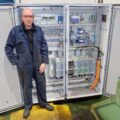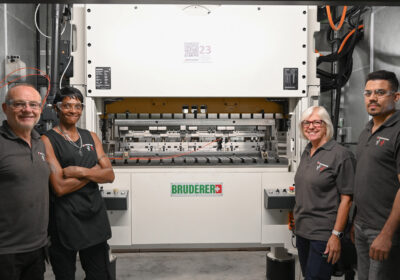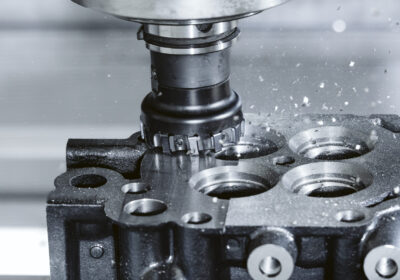A novel sensor system has been developed to help datacentres optimise the energy efficiency and sustainability of their operations. In the following article, Anu Kätkä from the measurement technology company Vaisala describes the development of a modular daisy-chain temperature/humidity sensor configuration, which has dramatically reduced cabling requirements and lowered the carbon footprint of building management systems (BMS).
Background
The global demand for datacentres is being driven by cloud-based services, AI, automation and digitisation. These data handling facilities house large amounts of IT infrastructure and require high levels of power to run the equipment and to cool it. The latest servers are more energy efficient and able to operate at higher temperatures. As major consumers of power and land, data centre operators have an undeniable responsibility to aggressively reduce emissions and lessen environmental impacts wherever possible. In addition, datacentres frequently contain critically important data, and it is not uncommon for 99.999% uptime to be a requirement. The monitoring and control requirements are therefore comprehensive and stringent.
Partners in innovation
Vantage Data Centers powers, cools, protects and connects the technology of the world’s well-known hyperscalers, cloud providers and large enterprises. Developing and operating across five continents in North America, EMEA and Asia Pacific, Vantage has evolved data centre design in innovative ways to deliver dramatic gains in reliability, efficiency and sustainability in flexible environments that can scale as quickly as the market demands.
Vaisala’s development project was initially prompted by the sustainability requirements of the new Vantage campuses. “We are constantly looking for ways to improve both the efficiency and sustainability of our datacentres,” explains Eugenio Lukianov, Principal Automation Manager, EMEA, Vantage Data Centers. “Due to their accuracy and reliability, Vaisala sensors are frequently specified in the requirements of our new or refurbished datacentres worldwide. Many of our facilities are large, and the sensor cabling requirement can be enormous, so we were keen to find a better solution,” he adds.
Engineers from Vaisala and Vantage found that the amount of cabling required at datacentres could be significantly reduced if the sensors could be re-designed to be daisy-chained, rather than each having their own individual cable. A sensor development project therefore progressed with this as its key objective, but additional benefits were also realised by the new sensor solution. “In order to facilitate the daisy-chain, it was necessary for the sensors to be ‘plug and play’ which made installation so much easier,” Eugenio says. “The sensor cables are initially coiled in the roof space, and then, once the servers are installed, the sensors are simply dropped into place. This modular approach also simplifies ongoing maintenance because any damaged sensors or cables can be quickly and easily swapped out.”
The cable reduction potential of the daisy-chain solution is very significant. For example, a single 100m datacentre aisle, with 30 instruments at 3m spacing, each with a dedicated cable and a 3m cable drop would require about 1695 metres of cable, which is more than a mile of cable! In contrast, if the same aisle is equipped with the daisy-chain solution, the cabling drops to just 187 metres, representing an 89% drop in carbon footprint.

Environmental measurements at Vantage Data Centers
One of the key measures of sustainability at datacentres is power usage effectiveness (PUE), which is derived by dividing total power consumption by the power used to operate the IT equipment. So, the more efficient the datacentre, the lower the PUE, and Eugenio says: “This is an important metric for us – we continuously create downward pressure on this figure with accurate measurements and tight control of the cooling operations.”
The sensor daisy-chains at Vantage transmit data to the Vantage servers, and the ongoing accuracy of the measurements is essential for the efficiency of cooling. Vaisala sensors are also deployed outside the building, so that outdoor air can be utilised by economisation to reduce the energy required for cooling and thereby lower the PUE.
In addition to the critical areas of the Vantage datacentres, Vaisala sensors are also located in non-critical rooms such as storage areas and offices, providing data for normal HVAC control.

Why Vaisala?
At Vaisala, we believe that by specifying our measurement technologies, datacentre customers can ensure that the efficiency of their cooling operations is underpinned by accurate data. However, at Vantage, Eugenio believes that the benefits extend beyond long-term accuracy and energy efficiency. “The modularity of the daisy-chain saves time and money during installation and maintenance, and with our partners and system integrators utilising Vaisala technology, we have been able to reduce the volume of spares and training that are required.”
The daisy chain systems have now been installed for up to two years in UK campuses, and Eugenio says: “We are very pleased with the way that Vaisala responded to our request, working collaboratively with us to develop the daisy-chain solution.” Reflecting on performance to-date, he adds: “So far, the accuracy has been very good and there have been no complaints from our operational teams.”
Looking forward, Eugenio says: “The number of organisations looking to use datacentres is constantly expanding, and all of them want to secure a minimum 5-year capacity, so the sector is set for even more growth. We will therefore ensure that more sites benefit from the sensor daisy-chain solution, as our business further embraces sustainability.”







